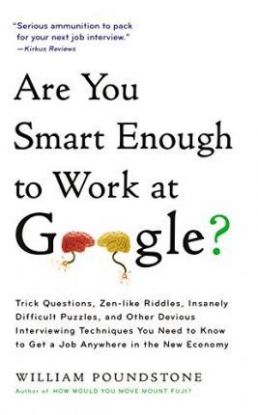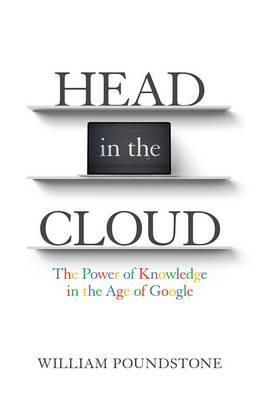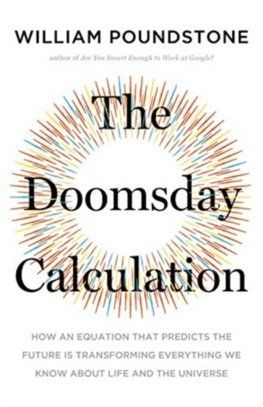William Poundstone
autor
Rock Breaks Scissors
In ROCK BREAKS SCISSORS, William Poundstone explains how to forecast our unpredictable world through mind-reading for real life. Using the scientifically proven idea that we are hard-wired to believe the world is more predictable than it is, Poundstone demonstrates how we can use this to personal advantage in everyday situations, ranging from sports betting to the stock market, fudged expense accounts to IRS audits, and much, much more. An intriguing blend of psychology and behavioral economics, this book is a practical, fascinating study of the far-reaching implications of human nature and how we can turn the odds in our favor.
Vypredané
10,93 €
11,50 €
How would you move mount Fuji?
Microsoft's interview process is a notoriously gruelling sequence of brain-busting questions that separate the most creative thinkers from the merely brilliant. So effective is their technique that other leading corporations - from the high-tech industry to consulting and financial services - are modelling their own hiring practices on Bill Gates' unique approach. HOW WOULD YOU MOVE MOUNT FUJI? reveals for the first time more than 35 of Microsoft's puzzles and riddles, such as: * Why does a mirror reverse right and left but not up and down? * If you could eliminate one U.S. state, which would it be? * How many piano tuners are there in the world? And for the first time, this book supplies answers and approaches using creative analytical thinking that works. Anyone in business, and everyone who wants to be, will find this book a valuable new approach to hiring, identifying talent in an organization, and getting the job of a lifetime.
Vypredané
13,78 €
14,50 €
Are You Smart Enough to Work at Google?
Are You Smart Enough to Work For Google?
Vypredané
5,65 €
5,95 €
Head in the Cloud
The real-world value of knowledge in the mobile-device age. More people know who Khloe Kardashian is than who Rene Descartes was. Most can't find Delaware on a map; don't know what Frank Lloyd Wright did for living; can't say how many calories are in a Big Mac or how many candles are on a menorah. How important it is to know things, anyway? William Poundstone uses Big Data survey technology to examine how knowledge relates to wealth, health, politics, and behavior. HEAD IN THE CLOUD identifies the types of knowledge that still matter (and those that don't). It asks why Fox News viewers don't know which party controls Congress; why we're okay with spelling errors on menus but not on resumes; how we can navigate clickbait and media spin to stay truly informed. HEAD IN THE CLOUD is a witty, practical guide to succeeding in a culturally illiterate age. "
Vypredané
13,78 €
14,50 €
Head in the Cloud
What's the point of knowing anything when facts are so easy to look up? Just reach for your computer, tablet or mobile and ask the sky. We're living in the golden age of rational ignorance where more people know who Khloe Kardashian is than who Rene Descartes was and most of us can't name the largest ocean on the planet. Yet the latest research indicates that the better informed are healthier, happier and often dramatically wealthier. Bestselling author William Poundstone conducts a hilarious and humbling investigation into the true worth of knowledge. What does it tell you, for example, when those who can pinpoint a country on a map are less likely to favour invading it? Underpinned by big data analysis and illustrated with eye-opening anecdotes, Poundstone's Head in the Cloud is an entertaining manifesto on the surprising benefits of broadening your horizons, as well as a warning of the dangers of an ill-informed electorate.
Head in the Cloud
The real-world value of knowledge in the mobile-device age. More people know who Khloe Kardashian is than who Rene Descartes was. Most can't find Delaware on a map, correctly spell the word occurrence, or name the largest ocean on the planet. But how important is it to fill our heads with facts? A few keystrokes can summon almost any information in seconds. Why should we bother learning facts at all? Bestselling author William Poundstone confronts that timely question in HEAD IN THE CLOUD. He shows that many areas of knowledge correlate with the quality of our lives--wealth, health, and happiness--and even with politics and behavior. Combining Big Data survey techniques with eye-opening anecdotes, Poundstone examines what Americans know (and don't know) on topics ranging from quantum physics to pop culture. HEAD IN THE CLOUD asks why we're okay with spelling errors on menus but not on resumes; why Fox News viewers don't know which party controls Congress; why people who know "trivia" make more money than those who don't; how individuals can navigate clickbait and media spin to stay informed about what really matters. Hilarious, humbling, and wildly entertaining, HEAD IN THE CLOUD is a must-read for anyone who doesn't know everything.
Vypredané
8,50 €
8,95 €
How to Predict Everything
How do you predict something that has never happened before?
There's a useful calculation being employed by Wall Street, Silicon Valley and maths professors all over the world, and it predicts that the human species will become extinct in 760 years. Unfortunately, there is disagreement over how to apply the formula, and some argue that we might only have twenty years left.
Originally devised by British clergyman Thomas Bayes, the theorem languished in obscurity for two hundred years before being resurrected as the lynchpin of the digital economy. With brief detours into archaeology, philology, and overdue library books, William Poundstone explains how we can use it to predict pretty much anything. What is the chance that there are multiple universes? How long will Hamilton run? Will the US stock market continue to perform as well this century as it has for the last hundred years? And are we really all doomed?
Vypredané
15,68 €
16,50 €
The Doomsday Calculation
From the author of Are You Smart Enough to Work at Google?, a fascinating look at how an equation that foretells the future is transforming everything we know about life, business, and the universe.
In the 18th century, the British minister and mathematician Thomas Bayes devised a theorem that allowed him to assign probabilities to events that had never happened before. It languished in obscurity for centuries until computers came along and made it easy to crunch the numbers. Now, as the foundation of big data, Bayes' formula has become a linchpin of the digital economy.
But here's where things get really interesting: Bayes' theorem can also be used to lay odds on the existence of extraterrestrial intelligence; on whether we live in a Matrix-like counterfeit of reality; on the "many worlds" interpretation of quantum theory being correct; and on the biggest question of all: how long will humanity survive?
The Doomsday Calculationtells how Silicon Valley's profitable formula became a controversial pivot of contemporary thought.
Drawing on interviews with thought leaders around the globe, it's the story of a group of intellectual mavericks who are challenging what we thought we knew about our place in the universe. The Doomsday Calculationis compelling reading for anyone interested in our culture and its future.
How to Predict Everything
How do you predict something that has never happened before?
There's a useful calculation being employed by Wall Street, Silicon Valley and maths professors all over the world, and it predicts that the human species will become extinct in 760 years. Unfortunately, there is disagreement over how to apply the formula, and some argue that we might only have twenty years left.
Originally devised by British clergyman Thomas Bayes, the theorem languished in obscurity for two hundred years before being resurrected as the lynchpin of the digital economy. With brief detours into archaeology, philology, and overdue library books, William Poundstone explains how we can use it to predict pretty much anything. What is the chance that there are multiple universes? How long will Hamilton run? Will the US stock market continue to perform as well this century as it has for the last hundred years? And are we really all doomed?
Vypredané
13,25 €
13,95 €











